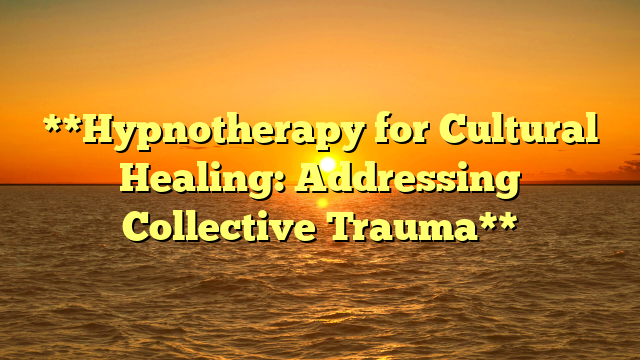
Cultural trauma is a profound and often overlooked issue that affects communities, societies, and even entire nations. It arises from shared experiences of violence, oppression, displacement, or systemic injustice, leaving deep emotional and psychological scars that can persist for generations. While individual therapy is commonly used to address personal trauma, collective trauma requires a broader, more inclusive approach. Hypnotherapy, a therapeutic technique that accesses the subconscious mind, is emerging as a powerful tool for cultural healing, offering a pathway to address and resolve collective trauma.
Understanding Collective Trauma
Collective trauma occurs when a group of people experiences a shared event or series of events that disrupt their sense of safety, identity, and belonging. Examples include wars, genocides, colonization, slavery, and natural disasters. Unlike individual trauma, collective trauma is embedded in the cultural memory and can manifest in behaviors, beliefs, and societal structures. It often leads to cycles of pain, mistrust, and conflict that are passed down through generations, perpetuating suffering long after the initial events have ended.
The Role of Hypnotherapy in Cultural Healing
Hypnotherapy, which involves guiding individuals into a relaxed, trance-like state to access the subconscious mind, can be adapted to address collective trauma. While traditionally used for individual therapy, hypnotherapy’s principles can be applied to groups, communities, and even entire cultures. Here’s how hypnotherapy can contribute to cultural healing:
1. **Accessing Subconscious Memories**
Collective trauma often resides in the subconscious mind, influencing behaviors and attitudes without individuals being fully aware of its impact. Hypnotherapy can help uncover these hidden memories and emotions, allowing communities to confront and process their shared pain. By bringing these experiences to the surface, hypnotherapy creates an opportunity for healing and reconciliation.
2. **Breaking Generational Cycles**
Trauma can be inherited, with the emotional and psychological effects passed down through generations. Hypnotherapy can interrupt these cycles by addressing the root causes of trauma and helping individuals release inherited pain. This process not only benefits the current generation but also creates a healthier foundation for future ones.
3. **Promoting Forgiveness and Reconciliation**
Collective trauma often leads to deep-seated anger, resentment, and division. Hypnotherapy can facilitate forgiveness by helping individuals and groups reframe their experiences and let go of negative emotions. Through guided visualization and positive suggestions, hypnotherapy can foster empathy and understanding, paving the way for reconciliation and unity.
4. **Rebuilding Cultural Identity**
Trauma can erode a community’s sense of identity and purpose. Hypnotherapy can help restore this by reinforcing positive cultural values, traditions, and strengths. By reconnecting individuals with their cultural heritage, hypnotherapy can empower communities to reclaim their identity and build a shared vision for the future.
5. **Encouraging Collective Resilience**
Healing from collective trauma requires resilience—the ability to adapt and thrive despite adversity. Hypnotherapy can strengthen resilience by instilling a sense of hope, empowerment, and collective agency. Through group sessions or community workshops, hypnotherapy can help communities develop the tools and mindset needed to overcome challenges and create positive change.
Implementing Hypnotherapy for Cultural Healing
To effectively address collective trauma, hypnotherapy must be integrated into a broader cultural healing framework. slot pulsa involves collaboration between hypnotherapists, community leaders, and cultural practitioners. Group hypnotherapy sessions, for example, can be conducted in community centers or cultural gatherings, creating a safe space for shared healing. Additionally, hypnotherapy techniques can be combined with traditional healing practices, storytelling, and rituals to create a holistic approach that respects and honors cultural traditions.
It is also essential to approach cultural healing with sensitivity and respect. Hypnotherapists must be trained to understand the historical and cultural context of the trauma they are addressing. Building trust within the community is crucial, as collective healing requires a sense of safety and mutual respect.
Collective trauma is a complex and deeply rooted issue that demands innovative and inclusive solutions. Hypnotherapy offers a unique and powerful approach to cultural healing, providing a pathway to address and resolve the pain that binds communities. By accessing subconscious memories, breaking generational cycles, promoting forgiveness, rebuilding cultural identity, and fostering resilience, hypnotherapy can play a vital role in healing collective wounds. As societies continue to grapple with the legacies of trauma, hypnotherapy stands out as a promising tool for fostering unity, understanding, and lasting peace. Through its application, we can move closer to a world where communities are not defined by their pain but by their strength and capacity for healing.




